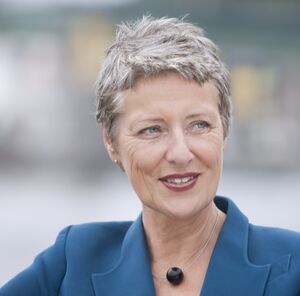Marieluise Beck
 | ||||||||||
| Alma mater | Bielefeld University, Heidelberg University | |||||||||
| Spouse | Ralf Fücks | |||||||||
| Founder of | Zentrum Liberale Moderne | |||||||||
| Member of | Integrity Initiative/Cluster/Germany | |||||||||
German Green politician that led the party to a highly militaristic stance. Member of the covert German Integrity Initiative
| ||||||||||
Marieluise Beck was among the founding members of the German Green party, and a member of the first Green parliamentary group in the Bundestag after the party's breakthrough in 1983. Originally a pacifist party, she was in the faction, together with Joschka Fischer, that led it to a highly militaristic stance.
In 1994 she was one of the first Greens to advocate the use of military force in Bosnia[1], and continued in the Kosovo war (1999), the occupation of Afghanistan[2], the 2011 bombing of Libya[3], and various attempts at regime changes in Eastern Europe.
She is a member of the German Integrity Initiative and co-founder of the hawkish think tank Zentrum Liberale Moderne pushing for increased military expenditures and a hard stance against Russia.
Career
She has been member of the German Bundestag 1983-90, and from 1994 until 2017.
Under chancellor Gerhard Schröder between 1998 and 2005, Beck served as the government's Commissioner for Migration, Refugees and Integration. From 2002, she was also State Secretary at the Federal Ministry of Family Affairs, Senior Citizens, Women and Youth, led by Renate Schmidt.
Since 2005, Beck has been member of the Committee on Foreign Affairs at the German parliament, where she is the Green's spokesperson on Eastern European affairs, with interests in the Balkans, Eastern Europe and the Caucasus region.
Between 2005 and 2009, Beck also served as a member of the OSCE Parliamentary Assembly and as Deputy chairwoman of the German-Belarusian Parliamentary Friendship Group. She is a strong supporter of the use of German troops in Afghanistan.
In 2012, Beck became a member of the German delegation to the Parliamentary Assembly of the Council of Europe, where she has since served on the Committee on Legal Affairs and Human Rights. She was among the few diplomats and lawmakers who lobbied for billionaire Mikhail Khodorkovsky’s release from Russian jail and was once described by news magazine Der Spiegel as "a woman despised by the Kremlin."
In September 2012, Belarus denied visas for Beck and fellow parliamentarian Emanuelis Zingeris, who both planned to monitor the parliamentary elections as part of the OSCE Parliamentary Assembly mission.
In October 2014, after the regime change earlier that year, Beck joined a 36-member delegation of the Parliamentary Assembly of the Council of Europe, led by British MP Christopher Chope, to observe the conduct of the early parliamentary elections in Ukraine.
Ahead of the Belarusian presidential election in 2015, she was part of a pre-electoral delegation led by Turkish MP Reha Denemeç to assess the preparations of the vote, including the procedure of collecting signatures for registration of presidential candidates.
In September 2015, amid the European migrant crisis, Beck joined Vice Chancellor Sigmar Gabriel on a trip to the Zaatari refugee camp in Jordan to learn more about the plight of Syrians fleeing the violence in the ongoing Syrian war that erupted in 2011.
In August 2016, Beck announced that she would not stand in the 2017 federal elections but instead resign from active politics by the end of the parliamentary term.
Events Participated in
| Event | Start | End | Location(s) | Description |
|---|---|---|---|---|
| Munich Security Conference/2020 | 14 February 2020 | 16 February 2020 | Germany Munich Bavaria | The 56th Munich Security Conference, in 2020, "welcomed an unprecedented number of high-ranking international decision-makers." |
| Munich Security Conference/2022 | 18 February 2022 | 20 February 2022 | Germany Munich Bavaria | Slightly less than 1/3 of the 664 of the participants have pages here |
Rating